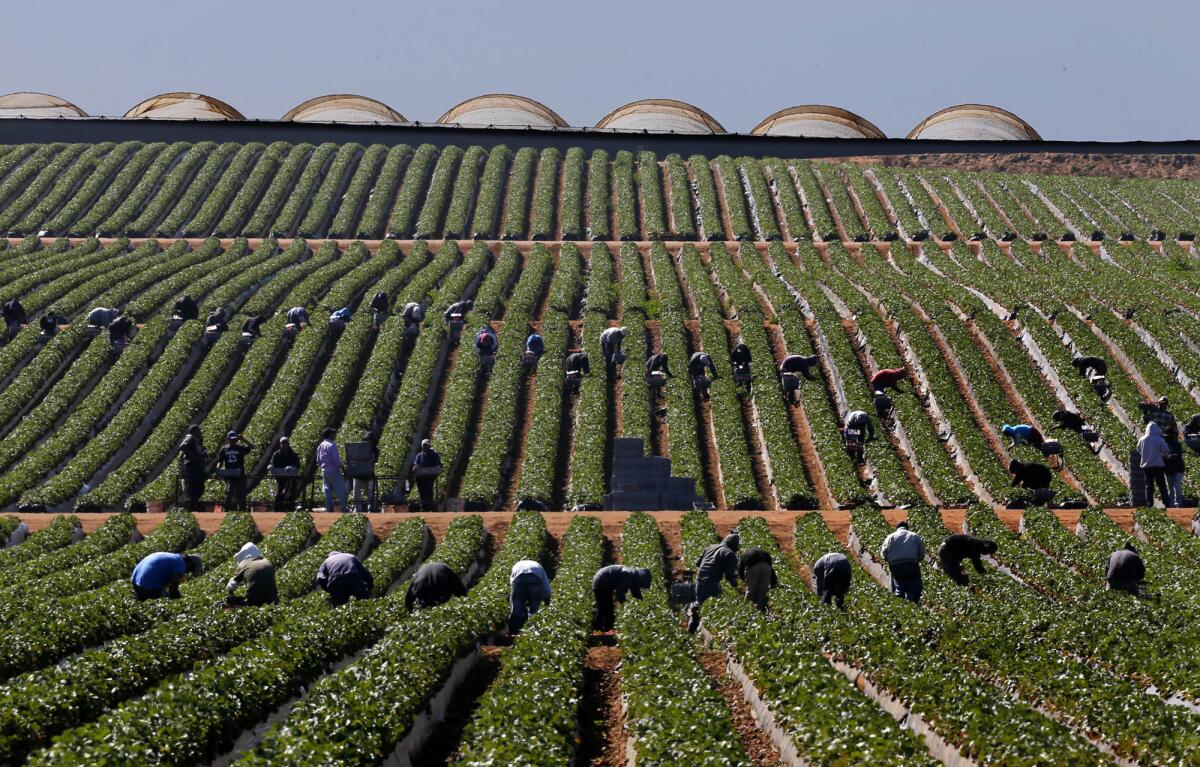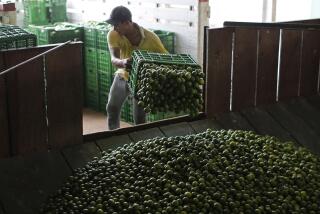Pickers back at work in Baja California, but animosity remains

The farmworker strike that has crippled Baja California agricultural exports appears to be easing, but labor leaders and industry officials remain at odds and hundreds of protesters on Monday headed to the state capital to keep pressing for higher wages.
Industry and government officials said harvest production totals are almost back to normal as thousands of laborers returned to the fields over the weekend after nearly two weeks of being on strike.
The work stoppage in the San Quintin region 200 miles south of San Diego — a supplier of produce to major U.S. retailers — led to some shortages and economic damage estimated in the tens of millions of dollars.
Talks on Friday ended in acrimony after labor leaders rejected an offer by agribusinesses to boost wages by 15%. But after growers offered the raise to anyone who returned to work, the fields filled with pickers.
Industry and government officials say it is evidence that the coalition of groups leading the strike, the Alliance of National, State and Municipal Organizations for Social Justice, is not representing the wishes of farmworkers.
“The people are happy with the raises,” said Alberto Munoz, an attorney representing the Agricultural Council of Baja California, an association of growers. “The problem is with the alliance.”
Alliance leaders say that the number of laborers returning to work is fewer than estimated by the industry, and that the ones doing so don’t have a choice.
“They’re not returning because they want to,” said Fidel Sanchez, an alliance leader. “They are returning under protest, under threat.” He said agribusinesses will blacklist people if they don’t go back to work immediately.
Meanwhile, a caravan of buses filled with leaders and protesters that stopped over the weekend for demonstrations in Tijuana and Ensenada is expected to reach Mexicali on Tuesday. But the number of protesters has dwindled to a few hundred, from the thousands who marched Thursday in San Quintin. Supplies to sustain the movement have been exhausted after more than 10 days of protests, leaders say.
Amid the discord, both sides point to some progress in the discussions, including agreements to provide better access to healthcare, recognition for seniority and a commission to address worker complaints.
Wages remains the sticking point. Labor leaders, who initially wanted 300-peso daily wage rates, have dropped their demand to 200 pesos, about $13 a day. But growers said their offer to boost wages 15%, from an initial 6% increase, is final. Any higher amount, they said, would lead to an economic collapse.
The San Quintin Valley has dozens of growers, but a handful of agribusinesses control most of the production. Those include growers with deep political connections whose owners are former or current state government officials.
Driscoll’s, which ships Baja California berries to major retailers across the U.S., said its main grower in the region, BerryMex, is boosting wages by as much as 40% for about 4,000 pickers.
Soren Bjorn, a Driscoll’s executive vice president, said the company has been unfairly targeted, in part because its brand is widely known. Workers for BerryMex, he said, have long enjoyed better compensation and benefits than those at other farms in the area.
Bjorn took issue with some of the protesters’ tactics, but he said their actions have served to raise minimum standards in the San Quintin area. BerryMex, he said, has long been a leader on social responsibility issues. “I think if there were more growers like BerryMex things would be better in Baja than they are today,” Bjorn said.
Other major U.S. companies grow produce in Baja California, including Del Cabo. But their farms lie hundreds of miles from San Quintin in the southern part of the peninsula. They have not been accused of labor abuses by strikers.
The labor movement is drawing support from major unions in the United States. The AFL-CIO on Friday sent a letter to Mexico’s secretary of labor urging federal officials to protect the workers’ rights.
Twitter: @ricardin24
More to Read
Sign up for Essential California
The most important California stories and recommendations in your inbox every morning.
You may occasionally receive promotional content from the Los Angeles Times.











